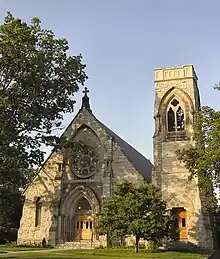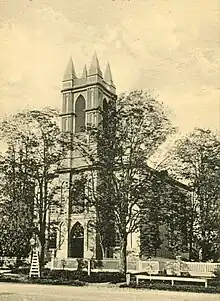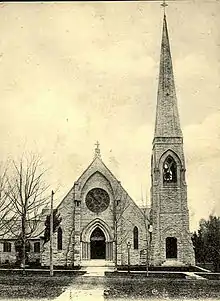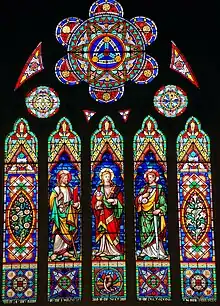St. John's Episcopal Church, Canandaigua
St. John's Episcopal Church is an episcopal church in Canandaigua, New York. It was built in 1872.
| St. John's Episcopal Church | |
|---|---|
 | |
| Religion | |
| Affiliation | The Episcopal Church |
| Location | |
| Location | Canandaigua (city), New York |
| Architecture | |
| Architect(s) | Emlen T. Littell |
| Type | Church |
| Style | Gothic Revival |
| Completed | 1872 |
| Specifications | |
| Direction of façade | West |
| Materials | Limestone, Stained glass, slate roof |
| Website | |
| http://www.st-johns-episcopal.org | |
History
The Episcopal presence in Canandaigua, New York began, formally, in February, 1799 with the formation of St. Matthew's Episcopal Mission. In 1814, St. John's Episcopal Church was organized and first met in the Ontario County, New York Court House in Canandaigua. St. John's erected a wooden church building in 1816. Bishop John Henry Hobart consecrated it that year.
Steady congregational growth necessitated more space. This led to the razing of the first church and the constructing of the current larger stone Gothic building done in the parish church style popular in the 19th century. Emlen T. Littell of New York City designed the building. This church was constructed in 1872 at a cost of $47,000 and consecrated in 1886. It contains several windows from the earlier wooden church, elaborate new stained glass windows imported from Europe, and one—The Parables Window—was designed by Daniel Cottier, who was considered an important influence on Louis Comfort Tiffany.
In 1908, new hardwood floors, choir stalls, and an organ were installed. The parish house and a chapel were added at the same time. In 1964-1965, an addition to parish house included classrooms, a new chapel, and a dining/ meeting room added to celebrate the church's 150th anniversary. Recent additions include a columbarium with a capacity of 136 niches and a memorial garden, outside the church. A capital campaign begun in 2017 allowed the parish to upgrade and improve five areas identified by parishioners as essential priorities.
Historical timeline
Old Church

1796 — Missionary services begun in Canandaigua by Robert G. Wetmore
1799 — February 4, first Episcopal congregation in Canandaigua, St. Matthew's, organized by The Right Rev. Philander Chase, Bishop.
1814 — September 27, St. John's Church organized. Met in courthouse.
1816 — December 12, first church building consecrated by Bishop John Henry Hobart; a wooden gothic structure on site of present church, costing $14,000.
1815 — The Rev. Alanson Welton, Rector.
1815 - 1819 — The Rev. Dr. Henry Ustick Onderdonk, Rector.
1820 — The Rev. William Barlow, Rector.
1834 — First Rectory on Gibson Street. House given by Mr. Grieg moved from N. Main Street to lot given by Mr. Gibson.
1836 - 1842 — The Rev. Augustus Palmer Prevost, Rector.
1844 — The Rev. Joseph Wayland, Rector
1850 — Trinity Church, Wall Street (NYC) gifts St John's $1,500.
1851 — Present Rectory build at cost of $4,000.
1867 — Church enlarged with 26 additional pews, repaired, painted, stoves removed and furnace added. Cost over $16,000.
1869 - 1875 — The Rev. C. M. Nickerson, Rector.
New Church
1872 — Original church torn down. New church erected, of stone with spire atop tower. Cost of $47,000 left parish with large debt. The present church was designed by Emlyn T. Littell of New York City. St. John's is built of various kinds of stone and its intricate and colorful display of stained glass windows is one of the most impressive in this area.
1880 — Bell installed as memorial to Moses Atwater, first Warden, by descendants
1886 — May 6, church consecrated after payment of debt.
1892 - 1905 — The Rev. Charles J. Clausen, Rector.
1895 — Permanent endowment fund established with legacy of $1,000, "interest only to be applied to current expense of the church."
1907 — The Rev. Herbert Gaylord became Rector, serving for 32 years.
1908 — Hardwood floors, choir stalls, and organ installed in church. New Parish house and chapel built.

1923 — Rectory repaired and improved at cost of $15,000.
1928 — Spire removed from church building after being found unsafe.
1939 - 1944 — The Rev. Eugene Marsden Chapman, Rector
1940 — Chapel established in south transept of church in memory of Frances Paul.
1944 - 1959 — The Rev. Robert C. Dunn, Rector
1959 - 1970 — The Rev. Harold D. Avery, Rector

1951 — Church building completely redecorated.
1965 — Addition to parish house providing 5 classrooms, chapel, and dining/meeting room. Organ rebuilt.
1970 - 1986 — The Rev. Robert W. Withington, Rector. Rectory named for him.
1986 - 1990 — The Rev. James A. Hubbard, Rector.
1992 - 1993 — Restoration of stained glass windows
1993 - 2008 — The Rev. Albert J. Keeney, Rector
2000 — Major restoration of Nave
2008 - 2013 — The Rev. Richard D. Krapf, Deacon
2010 — May. Columbarium and chapel dedicated and blessed by the Right Reverend Prince Grenville Singh, Ph.D., Bishop of Rochester.
2010 — July. The Rev. David Hefling, AOJN+, Rector
2011 — Complete redesign/restructuring of the parish hall to expand space and use as a reception area. Garden is designed and developed in backyard for Gleaners Community Kitchen use. Gardening program is launched as is "Red Wagon Food Pantry" - both to benefit Gleaners Kitchen.
2012 — Chapel is named, by Vestry vote, "All Saints Chapel."
2013 - 2014 — St. John's Bicentennial (1814 - 2014).
2014 - 2017 — The Very Rev. David Hefling, ObJN+, Dean of the Northeast District.
The Reverend David Hefling, Rector, is appointed as Diocesan Archivist at the 86th Diocesan Convention, by Bishop Singh. Joanne Wisor, a parishioner at Trinity Church, Geneva, NY, is appointed as Assistant Archivist.
2018 — The Reverend Patti Blaine, Deacon, is assigned to the parish by Bishop Singh.
External links
- CHURCHES OF CANANDAIGUA at the Wayback Machine (archived 6 September 2008)
- Sermon Preached in St. John's Church after the Assassination of President Lincoln Archived 2010-06-28 at the Wayback Machine